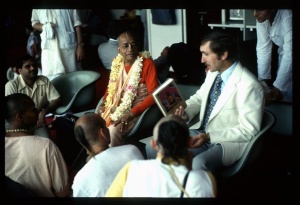CC Adi 7.130 (1975): Difference between revisions
(Vanibot #0027: CCMirror - Mirror CC's 1996 edition to form a basis for 1975) |
(Vanibot #0020: VersionCompareLinker - added a link to the Version Compare feature) |
||
| Line 2: | Line 2: | ||
<div style="float:left">'''[[Sri Caitanya-caritamrta (1975)|Śrī Caitanya-caritāmṛta (1975)]] - [[CC Adi (1975)|Ādi-līlā]] - [[CC Adi 7 (1975)|Chapter 7: Lord Caitanya in Five Features]]'''</div> | <div style="float:left">'''[[Sri Caitanya-caritamrta (1975)|Śrī Caitanya-caritāmṛta (1975)]] - [[CC Adi (1975)|Ādi-līlā]] - [[CC Adi 7 (1975)|Chapter 7: Lord Caitanya in Five Features]]'''</div> | ||
<div style="float:right">[[File:Go-previous.png|link=CC Adi 7.129 (1975)|Ādi-līlā 7.129]] '''[[CC Adi 7.129 (1975)|Ādi-līlā 7.129]] - [[CC Adi 7.131 (1975)|Ādi-līlā 7.131]]''' [[File:Go-next.png|link=CC Adi 7.131 (1975)|Ādi-līlā 7.131]]</div> | <div style="float:right">[[File:Go-previous.png|link=CC Adi 7.129 (1975)|Ādi-līlā 7.129]] '''[[CC Adi 7.129 (1975)|Ādi-līlā 7.129]] - [[CC Adi 7.131 (1975)|Ādi-līlā 7.131]]''' [[File:Go-next.png|link=CC Adi 7.131 (1975)|Ādi-līlā 7.131]]</div> | ||
{{CompareVersions|CC|Adi 7.130|CC 1975|CC 1996}} | |||
{{RandomImage}} | {{RandomImage}} | ||
==== TEXT 130 ==== | ==== TEXT 130 ==== | ||
<div class="verse"> | <div class="verse"> | ||
: | :'praṇava, mahā-vākya--tāhā kari' ācchādana | ||
:mahāvākye kari | :mahāvākye kari 'tat tvam asi'ra sthāpana | ||
</div> | </div> | ||
| Line 18: | Line 17: | ||
<div class="synonyms"> | <div class="synonyms"> | ||
praṇava—oṁkāra; mahā-vākya—principal mantra; tāhā—that; | praṇava—oṁkāra; mahā-vākya—principal mantra; tāhā—that; kari'-making; ācchādana—covered; mahā-vākye—in place of the principal mantra; kari—I do; 'tat tvam asi'ra sthāpana—establishment of the statement tat tvam asi. | ||
</div> | </div> | ||
| Line 25: | Line 24: | ||
<div class="translation"> | <div class="translation"> | ||
"Praṇava [oṁkāra] is the mahā-vākya [mahā-mantra] in the Vedas. Śaṅkarācārya's followers cover this to stress without authority the mantra tat tvam asi. | |||
</div> | </div> | ||
| Line 32: | Line 31: | ||
<div class="purport"> | <div class="purport"> | ||
The Māyāvādī philosophers stress the statements tat tvam asi, so | The Māyāvādī philosophers stress the statements tat tvam asi, so 'ham, etc., but they do not stress the real mahā-mantra, praṇava (oṁkāra). Therefore, because they misrepresent Vedic knowledge, they are the greatest offenders to the lotus feet of the Lord. Caitanya Mahāprabhu says clearly, māyāvādī kṛṣṇe aparādhī: "Māyāvādī philosophers are the greatest offenders to Lord Kṛṣṇa." Lord Kṛṣṇa declares: | ||
:tān ahaṁ dviṣataḥ krūrān saṁsāreṣu narādhamān | :tān ahaṁ dviṣataḥ krūrān | ||
:kṣipāmy ajasram aśubhān āsurīṣv eva yoniṣu | :saṁsāreṣu narādhamān | ||
:kṣipāmy ajasram aśubhān | |||
:āsurīṣv eva yoniṣu | |||
"Those who are envious and mischievous, who are the lowest among mankind, I perpetually cast into the ocean of material existence, into various demoniac species of life." (Bg. 16.19) Life in demoniac species awaits the Māyāvādī philosophers after death because they are envious of Kṛṣṇa. When Kṛṣṇa says in the Bhagavad-gītā ([[BG 9.34 (1972)|BG 9.34]]), man-manā bhava mad-bhakto mad-yājī māṁ namaskuru ("Engage your mind always in thinking of Me, become My devotee, offer obeisances to Me and worship Me"), one demoniac scholar says that it is not Kṛṣṇa to whom one must surrender. This scholar is already suffering in this life, and he will have to suffer again in the next if in this life he does not complete his prescribed suffering. One should be very careful not to be envious of the Supreme Personality of Godhead. In the next verse, therefore, Śrī Caitanya Mahāprabhu clearly states the purpose of the Vedas. | |||
</div> | </div> | ||
Latest revision as of 19:16, 26 January 2020

A.C. Bhaktivedanta Swami Prabhupada
TEXT 130
- 'praṇava, mahā-vākya--tāhā kari' ācchādana
- mahāvākye kari 'tat tvam asi'ra sthāpana
SYNONYMS
praṇava—oṁkāra; mahā-vākya—principal mantra; tāhā—that; kari'-making; ācchādana—covered; mahā-vākye—in place of the principal mantra; kari—I do; 'tat tvam asi'ra sthāpana—establishment of the statement tat tvam asi.
TRANSLATION
"Praṇava [oṁkāra] is the mahā-vākya [mahā-mantra] in the Vedas. Śaṅkarācārya's followers cover this to stress without authority the mantra tat tvam asi.
PURPORT
The Māyāvādī philosophers stress the statements tat tvam asi, so 'ham, etc., but they do not stress the real mahā-mantra, praṇava (oṁkāra). Therefore, because they misrepresent Vedic knowledge, they are the greatest offenders to the lotus feet of the Lord. Caitanya Mahāprabhu says clearly, māyāvādī kṛṣṇe aparādhī: "Māyāvādī philosophers are the greatest offenders to Lord Kṛṣṇa." Lord Kṛṣṇa declares:
- tān ahaṁ dviṣataḥ krūrān
- saṁsāreṣu narādhamān
- kṣipāmy ajasram aśubhān
- āsurīṣv eva yoniṣu
"Those who are envious and mischievous, who are the lowest among mankind, I perpetually cast into the ocean of material existence, into various demoniac species of life." (Bg. 16.19) Life in demoniac species awaits the Māyāvādī philosophers after death because they are envious of Kṛṣṇa. When Kṛṣṇa says in the Bhagavad-gītā (BG 9.34), man-manā bhava mad-bhakto mad-yājī māṁ namaskuru ("Engage your mind always in thinking of Me, become My devotee, offer obeisances to Me and worship Me"), one demoniac scholar says that it is not Kṛṣṇa to whom one must surrender. This scholar is already suffering in this life, and he will have to suffer again in the next if in this life he does not complete his prescribed suffering. One should be very careful not to be envious of the Supreme Personality of Godhead. In the next verse, therefore, Śrī Caitanya Mahāprabhu clearly states the purpose of the Vedas.